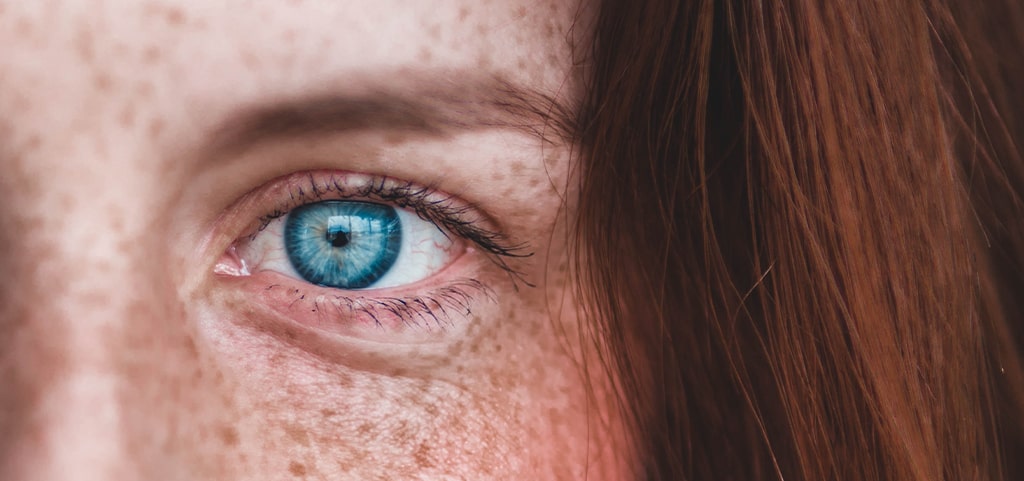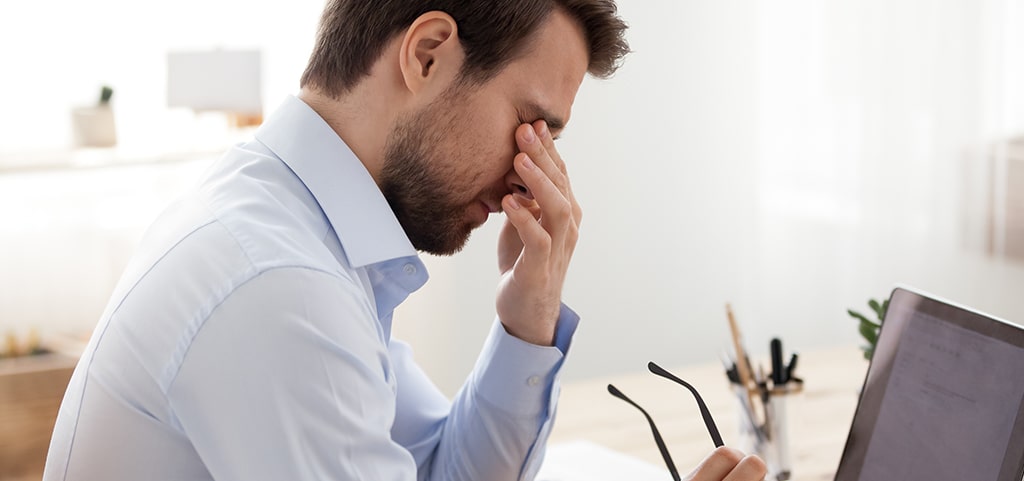Are you suffering from dry eyes? Get advice on how best to treat your symptoms. Dry eye syndrome is a health condition caused when your eyes do not create enough tears or when your tears evaporate too fast and therefore do not form a healthy tear film. The tears add moisture to the eyes and cleanse them of harmful particles. Without the right amount of tears, you could be at risk of infection or damage to the surface of the eyes.
We carried out research into the symptoms, causes and treatments for dry eyes.

Common symptoms of dry eyes:
The eyes feel very itchy
A stinging or burning sensation in your eyes
Redness in the eyes
Sensitivity to light
The feeling you have something in your eyes
Vision is blurred or your eyes are fatigued
Problems wearing contact lenses
Struggling with driving at night time
Watery or teary eyes as a result of irritation
What causes dry eyes?
Dry eye is a common health condition that can be caused for various different reasons. Sometimes your eyes produce fewer tears as a result of a hormonal condition. Other times, symptoms are worsened by changes to the normal tear film. Here are some of the reasons why you could be experiencing dry eyes:
• A dry environment or workplace. Heating or air conditioning can dehydrate the eyes.
• Staring at digital devices or computer screens for too long without taking regular breaks.
• Not positioning your computer screen correctly so your eyes end up opening too wide and as a result you start to blink less.
• You don’t take regular breaks from wearing contact lenses which can limit the flow of oxygen into your eyes. Oxygen is important as it helps your eyes produce natural tears.
• Overexposure to the sun can mean the tear film on the eye evaporates more quickly.
• Sometimes certain medications for other health issues can cause the symptoms of dry eyes.
• An autoimmune condition, like Lupus or Sjögren’s syndrome.
• You suffer from a vitamin A deficiency or are lacking omega-3 in your diet.
• The result of aging. Our eyes change as we get older and so you may be at higher risk of such conditions.

How can I treat dry eyes?
• In the winter, when you’re indoors, it’s a good idea to invest in a humidifier. This will add moisture to the air and prevent your eyes from getting dry.
• Follow the 20:20:20 rule – every 20 minutes, focus your eyes on an object located 20 feet away for 20 seconds. Make sure you also take the time to close your eyes and blink when you are fixing your eyes and focusing on a digital screen. Blinking more frequently will spread the tears evenly over your eyes. We advise also that you protect your eyes with blue-violet light lenses to alleviate eye strain and improve visual comfort and focus.
• Aim to position your computer below eye level, otherwise, if it is above eye level you are more likely to open your eyes wider which can reduce the evaporation of your tears between eye blinks.
• If you wear contact lenses, take them out occasionally and wear glasses to allow your eyes time to rest.
• Get a pair of wraparound sunglasses which block harmful UV rays and prevent wind and dry air from getting to your eyes.
• Keep taking the medication you are prescribed and seek professional advice to understand what may be causing your symptoms.
• Use artificial tears to treat severe dry eyes. Eye drops will keep your eyes lubricated. Your healthcare provider may also recommend other prescription medications if the condition is more severe.
• Maintain a healthy lifestyle. Try to eat foods rich in vitamin A, like carrots and broccoli and omega-3 fatty acids, found in fish and vegetable oils. Vitamin A can increase tear production, while omega-3 relieves the symptoms of dry eyes.
• Visit our website to find out about age-related eye conditions.
An interview with our qualified optician
David Hutchfield, our qualified optician, gives us some helpful tips and professional advice on this subject. He speaks of his own personal issues with dry eyes and explains how certain lifestyle changes can help to alleviate symptoms.
He says: “I’ve noticed… when I’ve been working from home full time, how dry and gritty my eyes have become. You spend nine hours a day looking at a computer screen without any fresh air. If you’re engrossed in work and you’ve got back-to-back meetings… it’s very difficult to go outside in the fresh air. I’ve noticed now… if it’s windy my eyes water so much. Indoors, they’re much drier than they were. This is a real symptom of working indoors all the time. It’s essential that you take regular breaks and follow the 20:20:20 rule.
“I find I now need eye drops for working indoors because it helps hydrate my eyes. Whereas, if I were to follow this rule and every 20 minutes looked at something 20 feet away and blinked and rehydrated my eyes, I wouldn’t necessarily need to do that. Or, if I then went and worked outside or headed out for a walk that would help. It’s something I really should do and everyone should do. But I appreciate it’s so difficult sometimes when you’ve got loads of work on.”

The impact of digital devices and remote working
David explains the impact of technology and our reliance on it when working from home or enjoying other more relaxed activities.
He adds: “The more you use a computer what happens is, your blink rate slows. So, for people that do gaming or watch TV a lot, particularly on a laptop or a tablet, everything kind of slows down but you need to be able to blink more frequently than you would if you were using a computer and that’s what dries the eyes out and causes you to have a bit of visual fatigue and makes your eyes feel gritty.
“Speak to your pharmacist or optician about eye drops because it is very difficult to be self-disciplined when you need to take a break from the computer. It’s not the same as dealing with people face-to-face. It’s a completely different environment that we are working in these days and I don’t think many people appreciate that.
“I noticed since the first lockdown my eyesight has deteriorated at a faster rate than it would have done if I’d been doing a mixture of being in the office and working from home. Just because you’re forced to go to the kitchen and get yourself some coffee. You then go to the shops and get some lunch. That then relaxes the eyes. But working on a laptop constantly at home, you don’t necessarily do that.
“You almost get institutionalised in your laptop. This then has a number of effects on your eyesight. The visual stress you get from a laptop and the artificial light. Central heating then also dries your eyes out. It can be very fatiguing.”
Keeping your eyes healthy
We hope this advice was helpful. Just remember, there are lots of little lifestyle changes you can make to improve the health of your eyes. Use eye drops to hydrate your eyes and if your symptoms are more serious and you require prescribed medication, don’t be afraid to seek the help of a professional. It is also important that your prescription is up to date and that you schedule regular eye tests. This is to ensure you are wearing the appropriate eyewear which will prevent symptoms from worsening and will also help you to avoid discomfort from eye strain.




